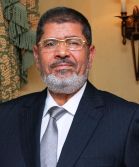2012 World News: Egypt

President Morsi Faces Early Tests
by Beth Rowen
Hopes for a smooth transition to a representative form government seemed realistic at the beginning of 2011, when Egypt's first democratically elected parliament in more than 60 years convened in January. Islamists, who fared well in 2011's elections, held more than 70% of the seats. The legislative body was charged with forming a committee to write a new constitution. The Muslim Brotherhood, which won 40% of the vote in parliamentary elections named as many as 70 Islamists, including 50 members of parliament, to the 100-person committee. However, a court of Hosni Mubarak-era appointees suspended the committee's work in April. The Muslim Brotherhood rescinded its earlier pledge not to put up a candidate in Egypt's first democratic presidential election. The move caused concern in the West, in Israel, and among liberals in Egypt as observers wondered if the Brotherhood had abandoned its vow to follow a course of moderation and was instead seeking a power monopoly. The first round, held on May 23, was inconclusive. The Muslim Brotherhood's Mohamed Morsi and former prime minister Ahmed Shafik faced off in a second round on June 16 and 17. Muslim Brotherhood Candidate Wins PresidencyTwo weeks before the run-off election, the military council reimposed martial law, dissolved Parliament on a technicality, gave the military legislative and budgetary authority, and released an interim constitution that further eroded the powers of the president. Many Egyptians and observers called the moves a coup and doubted that any real political change would be successful. However, the military council recognized the victory of Morsi over Shafik—a sign of hope in the face of looming challenges. Morsi won 51.7% of the vote. On July 10th—10 days into his presidency—Morsi defied the military and ordered that Parliament be reinstated. Legislators met briefly, and the Supreme Constitutional Court issued a ruling affirming their decision to dissolve Parliament. All indicators point to a protracted power struggle between Morsi and the military. President Morsi faced his first test in early August, when militants shot and killed 16 Egyptian soldiers at an army checkpoint in Egypt's Sinai Peninsula, which borders Israel. Several of the militants then drove into Israel, where their vehicle was destroyed by the Israeli military. Despite increased jihadist activity and warnings about a potential attack in the Sinai, the Egyptian Army was caught unprepared. Morsi ordered an airstrike on the Sinai, which killed about 20 militants. On Aug. 12, Morsi dismissed or "reassigned" several senior generals and the heads of each service branch of the Supreme Council of the Armed Forces (SCAF), an influential force in Egypt that has effectively been in control since the fall of Hosni Mubarak and recently has been in a power struggle with the new civilian government. Defense minister Mohamed Hussein Tantawi, a power broker in Egypt, was among the leaders Morsi stripped of their positions. Morsi also voided a constitutional declaration imposed by the military that limited the role of the president, and implemented a new order that vastly expanded his power and that of the legislature. The bold move sent a clear message that the civilian government had taken back control of the country. In Nov. 2012 as violence intensified between Israelis and members of Hamas in the Gaza Strip, President Morsi held indirect talks with Hamas and the Israeli government in an attempt to prevent further destabilization in the region. On Nov. 21, Egyptian foreign minister Mohamed Kamel Amr and U.S. secretary of state Hillary Clinton announced that a cease-fire had been signed. Any praise that Morsi received for intervening in the Gaza crisis was quickly overshadowed by a brazen power grab announced on Nov. 22, in which he declared authority over the courts, thereby removing any judicial oversight on his actions. He said the move was necessary because the judiciary, made up of Mubarak appointees, was threatening to suspend the constitutional assembly before it completed the task of drafting a new constitution. Progress on writing a new constitution had been stalled by members of the opposition on the committee. Morsi also said the edict would bring "political, social and economic stability" and remove barriers to a smooth transition of power. The decree was met with large protests in Tahrir Square, the scene of the uprising against Mubarak, and international condemnation. It also fueled accusations that one autocrat had succeeded another. Days later, on Nov. 26, Morsi seemed to have backtracked in response to the outpouring of rage, saying only "acts of sovereignty" would be exempt from judicial oversight. The clarification did little to placate his opponents. Under threat of being suspended by the courts, the constitutional assembly hastily approved a draft document on Nov. 29, which was widely criticized for its ambiguity and lack of depth and originality. The draft constitution passed because Morsi's opponents on the committee from secular groups and Coptic Christians boycotted the vote. Morsi said he would hold a referendum on the constitution as soon as possible. Thousands of protesters took to the streets to demonstrate against Morsi's power grab. The protests turned violent when members of the Muslim Brotherhood tried to break up the crowds. Several people were killed in the fighting. |
- More from 2012 News of the World









